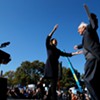Published March 6, 2013 at 2:02 p.m. | Updated October 23, 2020 at 4:16 p.m.
Burlington Mayor Miro Weinberger marked the anniversary of his election last Saturday with a public display that suggests he’s getting comfortable in the job. Wearing a gold lamé shirt, silver boots and a flouncy, feathered hat, the sometimes tongue-tied Weinberger waved and swayed as he led the raucous annual Mardi Gras parade through downtown. Hizzoner will never match the flamboyant populism of a showman politician such as former New York City mayor Ed Koch, who died last month. But Weinberger did bust a move on Main Street.
Burlington voters appear to increasingly accept their “fresh start” mayor, too. Even his partisan opponents concede that Weinberger’s popularity rating may have climbed past the 58 percent mark he achieved on Town Meeting Day 2012. That a whopping 72 percent of voters agreed to increase their own taxes last November by approving Weinberger’s “fiscal stability bond” cannot be entirely attributed to the “Obama effect.”
More recently, both Progressive and independent candidates have sought Weinberger’s endorsement in city council elections. Burlington’s tiny Republican coterie likewise finds little to fault in Year One of Weinberger’s three-year tenure. As for the lovestruck local business community, the mayor’s honeymoon period may never come to an end.
“The people of Burlington should be very proud of their mayor,” gushes Tom Torti, head of the Lake Champlain Regional Chamber of Commerce. “He’s done everything he could reasonably be expected to do.”
Not surprisingly, the Republican whom Weinberger trounced in last year’s Democratic landslide offers a less giddy appraisal. “His popularity stands somewhat as a contrast to the unpopularity of Bob Kiss,” suggests Kurt Wright, referring to Burlington’s previous mayor, who declined to run for reelection, ending a long streak of Progressive leadership in Burlington.
Rachel Siegel, a Ward 3 Progressive city councilor, has a similar view. “People were mad at the Progressive Party and glad to have someone else” in office, she says. The Kiss administration was roundly criticized for mismanaging Burlington Telecom as the result of “borrowing” nearly $17 million from the general fund and failing to pay it back in accordance with its state operating license.
Numbers Guy
Weinberger’s top priority is shoring up the city’s finances, and in that subject he gives himself a good grade. In an interview last week, the mayor noted the $9 million fiscal stability bond will partially refinance BT’s unauthorized debt to the city. Burlington International Airport’s shaky finances have also been steadied by attenuating the payback period for $12 million in loans related to BTV’s garage-expansion project.
Little-publicized deficits in the city’s water and sewer accounts have been eliminated as well, Weinberger says, observing that Moody’s identified this combined $2.7 million shortfall as a reason for lowering Burlington’s bond rating from A3 to Baa3 — the edge of the investment junkyard.
Moody’s move last June did serious damage to Burlington’s image, both on Wall Street and in the city’s own mirror. “It’s beneath us” to be rated so negatively, Weinberger said last year, lamenting that best-of-everything Burlington was beginning to be seen as a New England equivalent of “some dying Rust Belt city.” The downgrade is also whacking taxpayers in their wallets by pushing up the interest rates the city has to pay on its debts.
Last week, a confident Weinberger said he expects Moody’s to “give a sign of improvement” when it updates its rating of the city’s creditworthiness within the next few weeks.
The rookie mayor, who had no previous experience in running a public enterprise, is keen to be seen as an attentive fiscal steward. He notes that his upcoming budget, which is due in June, does not ask for any property-tax increases.
Most Progs and Republicans agree the Weinberger administration has restored some order to the city’s books. Paul Sisson, the interim chief administrative officer, gets a lot of the credit for that. Torti calls Sisson, who worked 26 years for accounting mega-firm KPMG, “monumentally competent.” Ward 2 Progressive councilor Max Tracy says the municipal moneyman with the natty threads has done “great work.”
But Sisson will not become the permanent CAO when his interim appointment expires in June, Weinberger says. The mayor praises Sisson’s work but says he wants a CAO with a strong background in municipal finance — and Sisson doesn’t have that kind of experience.
Can he clean up the Burlington Telecom mess? Vince Brennan, another Prog councilor, says he’s pleasantly surprised by the Weinberger administration’s handling of BT, noting that the new mayor didn’t “cut and run” by offloading the essentially bankrupt city-owned utility at a fire-sale price. But there’s still no solution in sight for BT. Weinberger can’t negotiate a deal with any prospective partner until Citibank’s $33 million federal suit against BT is settled inside or outside of court. A second round of city-Citi talks is scheduled for next week.
BT’s $17 million debt overhang also remains a problem despite the offset provided by the $9 million fiscal stability bond in conjunction with an $8 million surplus Burlington accrued during Kiss’ tenure. The city now has the money to compensate for an eventual write-off of the debt owed by BT, Weinberger says. Though he adds there’s still a chance that at least a portion of the $16.9 million will be paid back to the city’s general fund.
On another key financial matter, Weinberger has made no progress toward righting the imbalance between revenues and expenditures in the pension system for city employees. Retirement obligations are only 70 percent funded at present. Federal law does not permit so steep a shortfall in a private-sector pension system. And there’s no easy way to solve this complex financing problem, as Sisson made clear at a January briefing. He also noted that wresting concessions from city unions in bargaining talks is one strategy available to the administration.
Building a Rep
Weinberger’s first year in office could be characterized as long on process and short on product. The mayor has grappled with intangibles, such as the city’s balance sheet, and he’s brought together disparate interest groups to seek common ground on contentious issues, such as the Champlain Parkway and downtown and waterfront development.
But there’s been little physical change in the city since he became mayor last April, even though Weinberger has held press events touting public-works projects while encouraging downtown residential development. The new mayor is, after all, an experienced housing developer. He and his private-sector partners are building the 25-unit condo complex on North Avenue — one of only a couple of residential construction projects under way in Burlington.
At the city hall sit-down, Weinberger reiterated his commitment to facilitating in-fill housing. “We’ve seen downtown revitalization occur across the country in the last 20 years, with more and more people choosing to live in downtowns, but that hasn’t happened in Burlington,” he says. “That has to change.”
The mayor says he will soon commission an independent study of Burlington’s housing supply and demand in comparison to those of similar cities. It’s an enigma, he observes, that local nonprofit organizations have been “pioneering” the affordable-housing movement and yet housing in Burlington remains among the least affordable in New England.
Weinberger says he will soon turn his attention to downtown development sites such as the “superblock” on which Memorial Auditorium sits. First, though, the administration’s gaze is fixed on the waterfront.
Projects will start to take shape there within the next few months, the mayor says, pointing to construction of a $1 million skate park, $2.5 million worth of repairs to the bike path between Perkins Pier and the Urban Reserve, and $3 million in infrastructure upgrades near the Moran Plant.
Also in the pipeline: repairs and beautification initiatives at 30 sites around the city, financed through the $1 million Penny for Parks fund. The city is moving steadily toward construction of the long-stalled Champlain Parkway, the mayor maintains, estimating that bulldozers will start clearing its route through the South End some time next year — or maybe in 2015.
All these initiatives were “almost at a dead stop” when he took office, Weinberger points out.
The Moran Plant, meanwhile, looms as perhaps the most visible challenge confronting the city’s first Democratic administration in 31 years. Its Progressive predecessors were stymied for decades in efforts to rehab and repurpose the derelict hulk that squats on prime lakefront land. Weinberger says he “made the right decision” last year in scrapping the proposal for an ice-climbing wall inside Moran, but the city doesn’t have a new plan for the plant.
Prog councilor Brennan says Weinberger actually made the wrong decision on Moran; he says the reconstruction could have moved forward without a specified use. “We could’ve broken ground on Moran,” Brennan suggests. “The [tax increment financing] money for it is in place. It wouldn’t be a problem in finding something to occupy it. I mean, Miro’s a developer, isn’t he?”
Reid Allen, a seventysomething organizer for the Meals on Wheels program, proposed an alternative move on Moran during last week’s installment of “Mornings with Miro,” a weekly coffee klatch the mayor holds at the Bagel Café & Deli on North Avenue.
“Tear it down,” Allen advises.
“I hear you,” the mayor replies. “That’s on the table. It’s a complicated decision. So much money has been spent on it already.”
Public-Private Partnership
Weinberger’s vox-pop sessions have done a lot to market his man-of-the-people brand. Pulling out his iPhone at the bagel shop, the Yalie from Hartland offers to take Allen’s picture to accompany a tweet the mayor says he wants to send as an appeal for Meals on Wheels volunteers. The still-dark-haired 43-year-old also asks Allen’s breakfast companion, Cookie Manning, to list her complaints about the city she’s occupied for the last 59 years.
“It’s changed so much,” Manning muses. “All the building on Battery Street. Worries about walking around.”
Loyal Ploof, a Ward 4 council candidate, stops by the mayor’s table to complain about a city official. “She’s a piece of garbage,” spews Ploof, who’s wearing a “Ron Paul Restore America” baseball cap.
As many as 10 locals used to come to the bagel shop to schmooze in the run-up to the vote last November on the fiscal stability bond, Weinberger recalls. Today, only five pause to chat with the mayor, who shows up 15 minutes late for his advertised 8 a.m. appearance.
“It’s important to have a regular presence in the New North End,” Weinberger says. “There’s an unnecessary polarization between the northern and southern parts of the city.”
The New North End’s city council wards were also the only two that Weinberger lost in the mayor’s race.
Allen, the gregarious septuagenarian, flashes Weinberger a thumbs-up at the Bagel Café. “I like what you’re doing,” he tells the mayor. “You’re very visible.”
Why doesn’t the mayor, a Hill Section homeowner, do a similar hangout in the Old North End? wonders Councilor Tracy, suggesting, “He needs to recognize there’s a lot of folks living on low and moderate incomes who need help.”
Old North End councilor Siegel is more forgiving. She doesn’t feel the mayor is ignoring her neighborhood any more than all of Burlington’s other neighborhoods. “He’s not focusing on that level,” Siegel says. “He’s paying more attention to citywide stuff.”
Although Weinberger can seem awkward when pressing the flesh, he’s not camera shy. Mayoral aide Mike Kanarick gathers the media for frequent public appearances and press conferences, even when Weinberger doesn’t have anything of substance to say. That effort, combined with considerable tweeting and other social-media strategies, has resulted in a public profile far more prominent than that of Kiss, the hermit mayor, who did not respond to a phone message requesting comment on his successor’s record.
How does Weinberger describe what it’s like to reign over the Queen City?
“It’s the most demanding job I’ve ever had,” he says. “Intellectually it’s very challenging, which I like.”
What’s the best part of being mayor?
“Being able to respond to people when they ask for help.”
That can be an 80-hour-a-week gig, Weinberger acknowledges, noting there are days when he works until midnight and is back at it by 6 the next morning. Despite the grueling schedule, he makes a point of dining with his wife and daughter three times a week and tries to ski with his family at Bolton Valley on one day of the weekend.
Burlington First Lady Stacy Weinberger says she quit her job as codirector of the private Bellwether School in Williston in order to be “a stay-at-home mom.” The couple’s 7-year-old daughter, Li Lin, was a student there — until she switched to the public H.O. Wheeler Integrated Arts Academy in the Old North End.
Stacy Weinberger says her role demands “spontaneity” in order to accommodate sudden schedule shifts. The mayor himself observes that such lurches can be disorienting. One day last month, for example, he attended a memorial service for the Burlington School District’s diversity czar Daniello Balòn, who was a year younger than Weinberger when he died of a heart attack. The next morning, Weinberger was taking part in the noisy and joyous Penguin Plunge.
What’s Left
Weinberger presides over one of the most liberal enclaves in the United States — the city where the country’s most successful third party was born 30 years ago. But Weinberger is no liberal, Prog councilor Siegel says. “He’s a centrist,” she declares.
The mayor doesn’t measure up on the “economic, social and environmental justice” issues the Progressive Party holds dearest, Siegel says. She cites, for example, Weinberger’s support for basing the F-35 fighter bomber at the city-owned airport. “It’s an environmental catastrophe waiting to happen. And it’s going to make some poor people’s homes unlivable,” the outspoken Prog predicts.
Brennan, Siegel’s Ward 3 seatmate, complains that Weinberger has been wimpy on gun control. “It’s pathetic that we’re dominated by one party in the city council, the Vermont House and Senate and the governor’s office, and we can’t get legislation on guns,” chides Brennan, who was recently threatened with a handgun in a road-rage incident on the Burlington Beltline. “The mayor could have used his office to get this done,” the Prog councilor adds, referring to follow-up action on a recent city council resolution calling for a Burlington ban on assault rifles and high-capacity ammo clips.
Weinberger has expressed support for that move on the council’s part, but Brennan says the mayor hasn’t pressed the issue by demanding, for example, that the council’s public-safety committee take the next step toward making the assault-rifle ban a reality.
Tracy, a 26-year-old champion of marijuana legalization, notes that Weinberger remained silent on that issue, even after 70 percent of city voters said yes in November to a nonbinding referendum to regulate and tax pot sales. And Siegel says she’s disappointed by the mayor’s unwillingness to encourage an independent review of Burlington police conduct following the rubber-round shooting of protesters last summer.
The Progs and other exponents of working-class concerns are also displeased that Weinberger didn’t object to exempting Skinny Pancake outlets at the airport from the city’s livable-wage ordinance.
“There are lots of folks who are struggling to find jobs that pay a livable wage, affordable and safe housing, health care, and this mayor has demonstrated that his top priorities are waterfront development,” says James Haslam, director of the Vermont Workers’ Center on North Winooski Avenue. That “isn’t surprising,” Haslam adds, “because he’s a developer, so developers are well represented in the administration.”
Weinberger says in the city hall interview that he’s “committed to strengthening enforcement” of the livable-wage ordinance. “It’s going to be substantially strengthened,” the mayor promises.
He appears to have hired staffers capable of helping him achieve this and other objectives. Almost everyone interviewed for this story has good things to say about the quality of the mayor’s top appointees: Peter Owens at the Community and Economic Development Office, Eileen Blackwood as city attorney, Rubi Simon at the Fletcher Free Library and Jesse Bridges as director of Parks and Recreation. But Blackwood was brought on only after Weinberger flubbed his first attempt at filling the city’s top legal position: He sailed into gale-force headwinds when he tried to hire his buddy, Democratic operative Ian Carleton, as city attorney for $7000 more than the city’s pay scale indicated. The justification? Carleton boasted that he got his degree at Yale Law School. The mayor subsequently apologized, and Carleton withdrew his name from consideration.
Democratic/Progressive State Senator Tim Ashe, who narrowly lost the Dem mayoral nomination to Weinberger in 2011, says he’s most impressed by Weinberger’s selection of Bridges. “I particularly commend him for taking a chance on a relatively young parks director,” Ashe, 36, says in regard to the 31-year-old Bridges. “Bringing in a new generation isn’t something that happens often in municipal government.”
Ashe believes it’s too soon to render a verdict on Weinberger’s work as mayor. He does caution against the assumption that the fiscal stability bond will prove an effective instrument. It means that Burlington taxpayers “will be paying more up front with the potential of paying less down the road,” Ashe observes. “We’ll see how that works out.”
Independent City Councilor Karen Paul (Ward 6), a finance maven, agrees that judgments should be withheld at least until June, when Weinberger presents a city budget that’s entirely of his own making. Paul does say, however, that Weinberger is off to a strong start, citing his appointment of Gene Richards as interim airport director. Paul, the cochair of the mayor’s Airport Strategic Planning Committee, says she’s confident BTV will fly right with Richards at the controls.
But Paul sides with the Progs in criticizing Weinberger’s refusal to affirm unequivocally that the Moran Plant will remain publicly owned. The mayor’s stated unwillingness to have his “hands tied” by a Prog-backed resolution urging such a commitment temporarily soured relations between Weinberger and the four-member leftist minority on the 14-person council.
The Progs and the top Dem are now back to talking regularly, Tracy reports. And Weinberger, for his part, sees a more collegial process between city hall and the city council in comparison to the “divisions and acrimony” of previous years.
But with the Democratic mayor so secure in his political ascendancy, Kurt Wright sees reason to worry about one-party domination. “Burlington is known as a place where political issues are discussed freely and with passion,” Wright says. “I want to make sure that kind of debate isn’t stifled,” he adds, citing Weinberger’s smackdown of Ward 7 Republican Paul Decelles for casting the lone council vote against his fiscal stability bond.
Siegel offers the same cautionary note, saying she’s struck by how often the council’s seven Dems vote as a bloc. “I’m not opposed to the Democrats; I’m not opposed to Miro; I’m not opposed to most of the things on his agenda,” Siegel insists. “But I am opposed to a situation where one party can get a rubber stamp for whatever it wants.
“We need more democracy,” she says, “not less.”
(Disclosure: Tim Ashe is the domestic partner of Seven Days publisher and coeditor Paula Routly.)
The print version of this article was headlined "The Miro Show".
More By This Author
Speaking of...
-

Former Burlington Cop Charged With Lying About Drug Bust
Aug 30, 2017 -

Vermont Muralists Tackle More Blank Walls
Aug 2, 2017 -

Is the Vermont DMV up to the Job?
Jul 26, 2017 -

Cop on the Tweet: Chief's Social Media Posts Draw Criticism
Jul 5, 2017 -

Long, Strange Session: A Look Back at the 2017 Legislature
Jun 28, 2017 - More »
Comments
Comments are closed.
From 2014-2020, Seven Days allowed readers to comment on all stories posted on our website. While we've appreciated the suggestions and insights, right now Seven Days is prioritizing our core mission — producing high-quality, responsible local journalism — over moderating online debates between readers.
To criticize, correct or praise our reporting, please send us a letter to the editor or send us a tip. We’ll check it out and report the results.
Online comments may return when we have better tech tools for managing them. Thanks for reading.















































